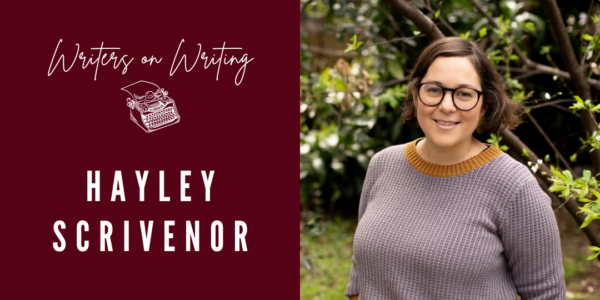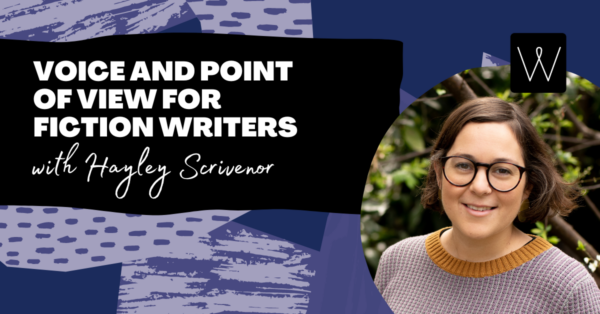
Writers on Writing is our regular conversation with a writer or industry professional about the writing craft, industry insights, and their own practice. This week, we spoke to multi-award-winning author Hayley Scrivenor about identifying her writer voice, ahead of her workshop Voice and Point of View for Fiction Writers.
In your debut crime novel Dirt Town, you utilised the rare first person plural point of view at pivotal moments, as well as third person for the majority of the book. How do you decide what POVs work best for your books?
I am endlessly fascinated by what these technical decisions can offer to a work. I think a novel works best when the point of telling and the story reinforce each other. Dirt Town has five points of view, one of which is a collective voice (the first person plural) – essentially the kids of this small country town who narrate together – something like a Greek chorus in a traditional Greek play. They say, This is what we saw. Most of the other characters’ chapters use third person, except for the voice of young Ronnie Thompson, the best friend of the missing girl at the heart of the story. Ronnie is such a naïve character that I found first person singular was the only option for her. It allowed me to play with what Ronnie thinks, versus what the reader understands about what is really happening. All these points of view come together for me to ask the question, What happens if we take someone out of a community? What is left behind?
My second novel, Girl Falling, (out on 30 July) is written entirely in the first person singular. I wanted to write something that was completely different to Dirt Town, and writing from just one point of view in the first person gave me a sense of claustrophobia and also the interiority that I was looking for. The question at the heart of the book is amplified by the choice of point of view – what do we do when something happens that we can’t accept? How do we know we’re not the crazy one in a given situation? It can be challenging to tell a story through only one character, but when it works it gives you something you can’t get any other way.
You wrote Dirt Town over many years and throughout a PhD in Creative Writing. How long did it take you to find your unique writing voice in that process?
Voice is notoriously hard to define and identify. If I had to try and define my ‘unique writing voice’, I would have say that it is what happens somewhere in the thousands of decisions that make up a novel. To give a less annoying answer, at its most simple, I think voice can be boiled down to word choice and what is noticed. I think before I wrote two novels, I had this idea that I as a writer had a ‘voice’ that I needed to ‘unlock’. In fact, I think every novel should be deeply rooted in character. You are trying to get to know the people in your book so that the words they use and the things they notice ring true for them. Even if you have the most omniscient of third person narration, the story you are trying to tell will exert influence over the words you choose and the things that happen. Your tendencies as a writer will obviously contribute to your voice, but if you’re doing your job right, the story and the characters should have the most to say about what strikes a reader when they read your work.
Reading is often cited as the best way for writers to improve their writing, but how do they avoid just imitating the authors they like the most?
I taught a class at university once where I was using someone else’s lecture notes and slides, and in the PowerPoint was a slide discussing the ‘anxiety of influence’. I remember vividly that it had a picture of SpongeBob SquarePants. The point of the slide was basically this: if you’re not reading books because you think they will influence you, then just know that you are still being influenced, all the time, but it will be by the lowest common denominator. Read everything, things you don’t fully understand but that others have told you are good. Imitate the greats. Train that muscle. Even if you are heavily influenced by one writer, by the time that impulse moves through you and into your specific characters, it may not be obvious at all. My most foundational writing influences, the books really deep down in my psyche, are books by Douglas Adams and Sue Townsend that I read when I was a kid – I doubt anyone could pick that when reading my work. Read widely and read deeply and it will all work out, I promise you!
Who are some of your favourite authors with strong writing voices?
Donna Tartt is an absolute go-to for me. She has this knack of identifying the misconceptions and flaws of her characters and using that to inform the language and events of the story. Siang Lu’s Ghost Cities, and The Whitewash before that, are so fun and playful and are total events of voice. I just finished To Sing of War by Catherine McKinnon. The breadth and scope of the points of view in that novel, the way we move between different characters – it’s just a masterclass. Everyone should read it!
Hayley Scrivenor’s debut novel, Dirt Town (2021), won a slew of national and international awards, including an ABIA for General Fiction Book of the Year, a Lambda Literary Award and a Crime Writers’ Association New Blood Dagger. She has a PhD in Creative Writing from the University of Wollongong, where her research centred on unusual points of view in fiction. Her second novel, Girl Falling, is forthcoming in the second half of 2024.
Enrol now in Voice and Point of View for Fiction Writers with Hayley Scrivenor, at Writing NSW on Saturday 27 July 2024, 10am – 4pm.
If you want to be the first to read great advice, prompts and inspiration from our incredible tutors, subscribe to our weekly e-newsletter Newsbite.
More from Writing NSW
Check out our full range of writing courses in Sydney, our online writing courses and our feedback programs to see how we can help you on your creative writing journey. Find out about our grants and prizes, as well as writing groups across NSW, and sign up to our weekly newsletter for writing events, opportunities and giveaways.

